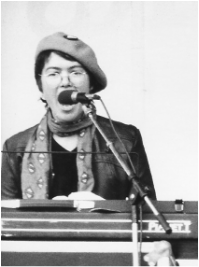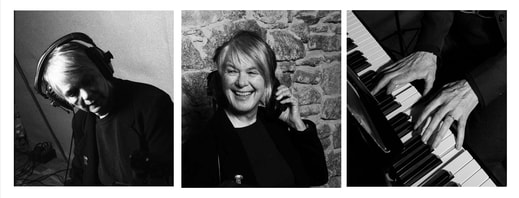|
After college I moved back down to London and found a room in a friend's squat in Brixton. On a sunny Saturday morning I walked into town and into Brixton Market, where the exotic vegetable stalls, lurid pink hanging pig carcasses and competing reggae soundtracks filled my eager senses. Sensimilla by Black Uhuru was both the soundtrack and the sweet pungent scent of strong grass that floated down every street, from every shop doorway. There was no need to travel any further to see the world, and Brixton held its magnetic pull on me for the next seven years, right up to the first explosion of riots. In the late seventies the squatting community gave shelter to punks, radical queers, feminists, left wing housing activists, Rastafarians, artists, junkies - people who were running away from one world and trying to create another. It was an idealistic time, if a little flawed and crazy round the edges, and, for a while at least, this eccentric mix of colour, class, gender and sexual orientation bobbed happily along on the same wave. I decided to devote myself to music with a nun-like devotion. I didn't care much about making money. Beyond feeding myself and staying warm in winter my needs were minimal. I cycled everywhere, to band practices, to my first paying gig as a restaurant pianist in the West End, to dance classes where I accompanied children as they wafted around as butterflies or autumn leaves. Some women from North London asked me to join a band as a keyboard player, and as soon as I had an outlet I started writing songs. The Spoilsports were part of a growing scene of feminist bands, much of which has been archived at The Women's Liberation Music Archive. Politics was intense. Anti-racism, anti-fascism, anti-sexism, gay liberation, Trotskyist groups of all kinds denouncing each other, Troops Out, anti-imperialism, anarchist collectives. And there were badges for everything pinned to our dungarees. We were self-righteous and provocative: "How Dare You Presume I'm Heterosexual!" and "A Woman Needs a Man Like A Fish Needs A Bicycle" clinked and rattled next to "Gays Against Fascism" and "Eat the Rich" One April afternoon, I was leaning out of the upstairs window of the house I shared with Racine in Strathleven Road. Someone was playing loud ska music that filled the street - Ghost Town by the Specials - and I heard Rico Rodriguez' sublime Jazz Jamaica trombone rising from the grey streets like a bird in an updraught. The sky held an eerie yellow darkness, a storm on the way, a clammy stillness and state of suspension. Thatcher had come to power and the innocence and idealism of the seventies was to crash to a halt. The National Front was marching in Lewisham and Deptford, and in Brixton anger was gathering like the storm clouds above. Reggae accompanied us into tougher times. Less One Love from Bob Marley and more Police and Thieves by Junior Murvin.
I remember walking back from a pub with Racine and a white policeman hissed "black c***" at her as we passed. I felt her rage and humiliation and her determination that I should not see her suffer. The notorious SUS laws were criminalising and radicalising a generation of black youth, and it didn't take much to spark off the first Brixton riot in 1981. One Saturday afternoon Sonia and I set out for the Ritzy Cinema to see Nine To Five and we found ourselves in the riot. A line of policemen was being driven down Railton Road by a very angry crowd. And here's the thing: the crowd I saw that day, as the riot began, were black, white, old, young, male, female - the whole community was furious. And as the defeated police retreated from the town centre to wait for reinforcements, Brixton had a party. Yes, there was looting, and yes, there was damaged property, but the mood on the traffic-free streets and in the pub I was in that night was one of carnival, a wild joyous celebration of an unthinkable victory. "Anybody want a television?" " Anyone want a fur coat?" It was the ancient human ritual of reversal, king for a day, where the powerless take power and the powerful tremble. Later, I learned that there had been 280 injuries to police, 45 injuries to members of the public, over a hundred vehicles burned, including 56 police vehicles, almost 150 buildings damaged, with 30 burned. There were 82 arrests. Guns of Brixton by the Clash... The Scarman Report into the riots found "unquestionable evidence of the disproportionate and indiscriminate use of 'stop and search' powers by the police against black people." As a consequence, a new code for police behaviour was put forward in the Police and Criminal Evidence Act 1984. ***** Nights out were the Women's Discos, and Racine was Queen of the Turntable. She kept a proud, inscrutable stillness while we boogied and flirted and threw shapes to I'm Coming Out and We Are Family. Once when when she was stopped by a policeman: Policeman "Name?" Racine "Ross" Policeman "First name?" Racine "Diana" The policeman wrote it down, and Racine held her poker face while we struggled not to collapse with laughter. I had started to play the saxophone, and little by little I was withdrawing from the social whirl, staying home at night to practice long notes. My friends would call round en route to a club and thought I must surely be depressed not to hang out with them. But I was so happy, so obsessively happy. I was listening to Coleman Hawkins and Ben Webster. I discovered John Coltrane, Wayne Shorter, Cannonball Adderley, and these giants of jazz were my new companions. I'd also been invited to play keyboards with Carol Grimes, a well-respected London r&b singer, and suddenly I was moving in a different circle of professional musicians. Carol gave me the gig because she wanted to encourage female musicians, but really, I was out of my depth, and my ego took a huge blow when I eventually got fired. But for the time being I was playing in the best music pubs in London - Dingwalls in Camden, The Cricketers at the Oval. I was learning Aretha Franklin tunes, Billie Holiday songs, and earning a musician's living.
1 Comment
10/6/2017 02:24:02 am
I need to read your blogs regularly to know more about your music, for the first time I am reading it and found it interesting. Thank you for sharing it with us
Reply
Leave a Reply. |
Carole NelsonMusings on a musical life. Archives
June 2022
|

 RSS Feed
RSS Feed
